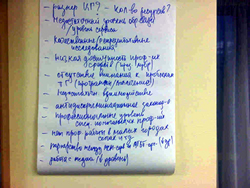Posted by Jirair Ratevosian, November 23, 2010

A list of challenges facing those fighting HIV among MSM in Eastern Europe and Central Asia.
There is something electrifying about this gathering of some 100 HIV and LGBT rights leaders, government officials, and regional stakeholders from across 15 countries of Eastern Europe and Central Asia. Many of amfAR’s MSM Initiative grantees are also here in Kiev, including representatives from community-based groups in Armenia, Belarus, Tajikistan, Kazakhstan, Ukraine, and Russia. But the topic is somber: MSM and transgender people in the region are at a dangerously elevated risk of contracting HIV.
Ukraine, which is playing host to this regional consultation, organized by WHO and UNDP, is also host to some of the region’s most alarming trends. According to Natalya Nizova, director of Ukraine’s National AIDS Centre, half of all HIV cases in Ukraine last year were diagnosed among MSM. Although the country was the first post-Soviet state to decriminalize male-male sexual activity (in 1991), HIV among MSM remains “invincible, hard to reach, and hard to control,” said Nizova.
In some of countries in the region, concentrated epidemics of HIV among MSM are spreading to other populations—including women, injecting drug users, and sex workers. The extent of this phenomenon is unknown but WHO data presented today shows that the population of MSM who report having sex with woman ranges from 14 percent in Poland to 45 percent in Russia.
Unbelievably, HIV prevention programs for MSM in the region really only took off ten years ago. Efforts since then have been largely fragmented and have confronted a plethora of barriers, including lack of sufficient data needed to inform their development, human rights violations, and insufficient resources.
While social and political factors vary considerably from one country to the next across the region, many participants here agree that for all countries, significant investments are needed to strengthen the knowledge base and to scale up interventions targeting MSM and transgender people.